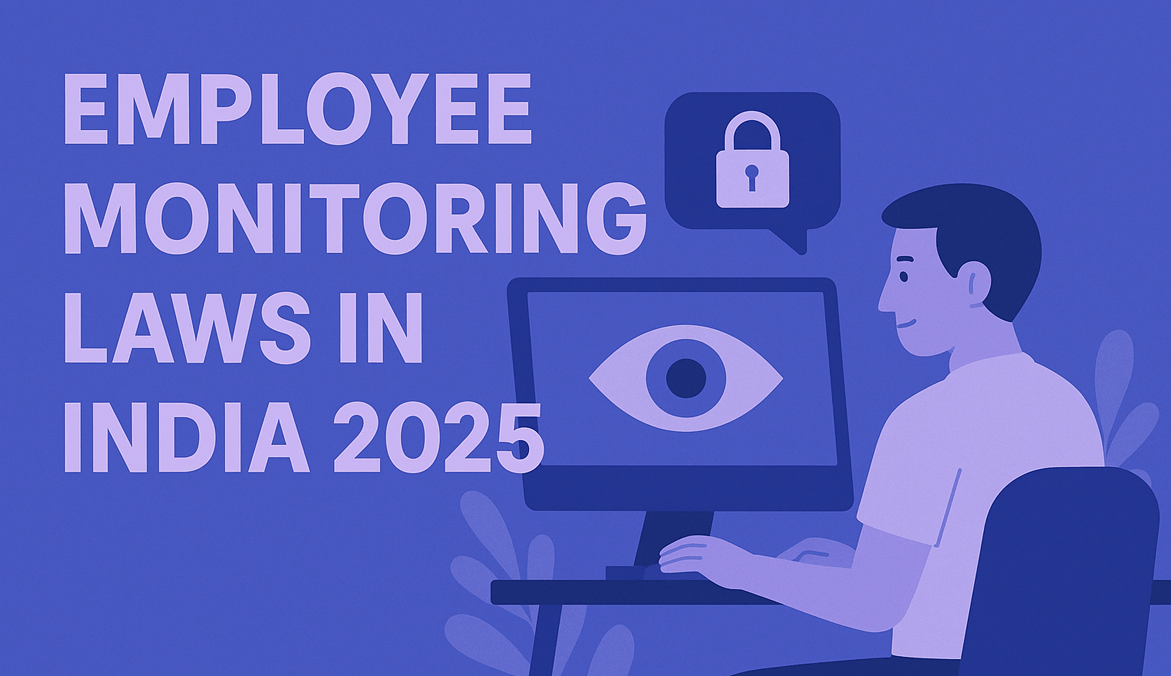Introduction
Can your company legally track employee activity in 2025?
With the rise of hybrid work, data breaches, and performance visibility tools, employee monitoring has become routine across Indian businesses. But as monitoring practices grow more advanced, so do the legal obligations that come with them.
Enter the Digital Personal Data Protection (DPDP) Act, 2023—India’s first comprehensive privacy law that fundamentally changes how organizations collect, process, and protect employee data.
While many employers use time-tracking, productivity tools, and communication logs to manage teams, few realize that without proper notice, consent, or safeguards, these practices could now be legally questionable—and even subject to penalties.
In this guide, we’ll break down:
- What the DPDP Act and existing labor laws say about employee monitoring
- The legal boundaries you must respect in 2025
- Best practices for compliant, ethical monitoring in India
Let’s demystify what’s legal, what’s not—and how to monitor your workforce the right way.
Why Monitor Employee Computer Activity?
Employee monitoring is no longer just a managerial tool—it’s a legal minefield. As technology enables deeper visibility into work habits, organizations must walk a tightrope between operational efficiency and individual privacy rights.
In India, the need for legal clarity has intensified for three key reasons:
- Rise of Remote and Hybrid Work
The traditional boundaries between work and personal space have blurred. With employees working from home, monitoring tools now operate across personal devices and networks—raising serious privacy concerns.📌 Without clear policies, monitoring remote employees can be seen as intrusive or even unlawful.
- Emergence of Comprehensive Data Privacy Laws
The Digital Personal Data Protection (DPDP) Act, 2023 introduces strict requirements around data collection, consent, and purpose limitation. This law has elevated data privacy from an IT issue to a boardroom responsibility.🛑 Monitoring without lawful basis or employee notification may now violate statutory rights.
- Lack of Awareness Among Employers
Many Indian businesses still rely on informal monitoring practices—manual checks, screen recordings, or productivity screenshots—without legal review or employee consent.Ignorance is no longer an excuse. In 2025, non-compliance can attract penalties, damage employer branding, or even trigger employee litigation.
Employee monitoring software in India is not illegal—but it must be intentional, transparent, and DPDP-compliant. Understanding the legal landscape is the first step toward safeguarding both your business and your workforce.
Compliant Employee Monitoring Practices in India (2025)
With the DPDP Act now in force and evolving expectations around digital privacy, Indian businesses must adapt their employee monitoring practices to stay both legal and ethical. Whether you’re tracking time, screen activity, or communication, compliance is no longer optional—it’s a strategic necessity.
Below are actionable best practices to help your organization align with employee monitoring laws in India in 2025:
- Provide Clear Notice to Employees
Under India’s employee privacy laws, employers must inform staff that monitoring is taking place. This includes:- What data is being collected (e.g., app usage, screen time)
- Why it’s being collected (e.g., productivity, compliance)
- How long it will be stored
- Who has access to it
📝 Include this notice in employment contracts or a standalone Employee Monitoring Policy.
- Define a Legitimate Monitoring PurposeTo stay compliant with the DPDP Act and employee monitoring regulations, businesses must monitor only for lawful and legitimate uses. Common purposes include:
- Ensuring productivity
- Protecting sensitive data
- Preventing insider threats
- Meeting industry compliance standards
Avoid “blanket surveillance” that isn’t tied to a specific, documented business purpose.
- Minimize Data Collection
One of the core DPDP principles is data minimization. That means you should only collect information essential to your purpose. For example:- Track work activity only during office hours
- Avoid keystroke logging or real-time camera use unless absolutely necessary
- Monitor only company-managed devices, not personal ones
This protects both your business and your employees’ trust.
- Restrict Access to Monitoring Data
To comply with India’s employee monitoring laws, access to monitoring reports should be limited to:- HR professionals
- Designated managers
- Legal or compliance officers (if needed)
Use role-based access controls in your monitoring software and log who accesses the data.
- Store and Retain Data Responsibly
The DPDP Act requires secure storage and timely deletion of personal data. Create a data retention policy that specifies:- How long employee monitoring data will be stored
- When and how it will be deleted
- What encryption or access controls are in place
This shows that you take privacy seriously and comply with the digital personal data protection act.
- Encourage Transparency and Dialogue
Legal compliance is just the baseline. True ethical monitoring involves building employee trust:- Host team-wide sessions explaining the “what” and “why” behind monitoring
- Allow employees to review their own monitoring data
- Invite feedback to improve your approach
Monitoring that’s collaborative—not secretive—builds a stronger, more accountable culture.
By adopting these best practices, companies in India can confidently implement employee monitoring in 2025—without violating the law or employee rights.
Penalties for Non-Compliance with Employee Monitoring Laws in India
Failing to comply with India’s employee monitoring laws in 2025 isn’t just risky—it can be legally and financially damaging. With the Digital Personal Data Protection (DPDP) Act now active, companies that ignore employee data rights may face severe penalties, public backlash, or litigation.
Here’s what’s at stake if you don’t align your monitoring practices with the law:
Financial Penalties Under the DPDP Act
The Data Protection Board of India (DPBI) has the authority to impose monetary penalties for violations of the DPDP Act. These include:
- Up to ₹250 crore for failure to take reasonable security safeguards (Section 33)
- Up to ₹200 crore for non-fulfillment of obligations related to children’s or employee data (Section 34)
- Up to ₹50 crore for failure to notify data breaches
Even one instance of unauthorized or undisclosed monitoring could trigger these penalties if it involves sensitive personal data.
Legal Action by Employees
If an employee feels their rights have been violated through unfair or undisclosed monitoring, they may:
- File a complaint with the Data Protection Board
- Pursue civil action for breach of privacy
- Escalate grievances through labor courts or regulatory bodies
As awareness grows, employees are more likely to demand legal accountability from employers.
Compliance Audits and Investigations
Organizations that process large volumes of employee data—especially in sectors like IT, BFSI, or BPO—may be subject to:
- Surprise audits
- Data protection assessments
- Disclosure requests in case of complaints or breaches
Non-compliance can lead to restrictions on data processing, reputational damage, and client distrust.
Reputational Risk
Beyond legal consequences, mishandling employee monitoring can damage:
- Employer branding and employee morale
- Trust with clients or international partners
- Your ability to attract top talent—especially in tech and remote-first sectors
In an era where digital ethics matter, how you monitor is as important as what you monitor.
Need a Monitoring Tool That Supports Compliance?
Mera Monitor is designed to help Indian businesses track productivity and activity without violating employee privacy. Built with role-based access, transparent reports, and privacy-first configurations, it’s the perfect solution for a post-DPDP world.
Conclusion: Monitor Smart, Stay Compliant
Employee monitoring has become a business necessity—especially with the rise of remote work, digital collaboration, and data-driven performance management. But in 2025, how you monitor employees in India is just as important as why.
With the Digital Personal Data Protection Act (DPDP) in effect, businesses must now treat employee data with the same seriousness as customer or client information. That means:
- Being transparent about monitoring practices
- Ensuring legal purpose and data minimization
- Respecting employee rights and privacy
- Putting proper safeguards and policies in place
Done right, employee monitoring can foster productivity, security, and trust. Done wrong, it can lead to legal penalties, reputational damage, and employee dissatisfaction.
 Gift Card ₹999
Gift Card ₹999

